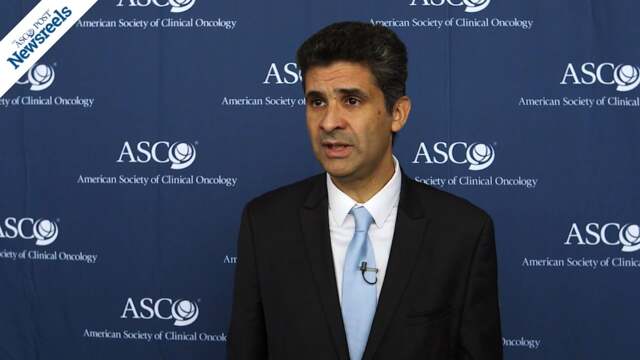Adverse Pathologic Findings in Low-Volume Intermediate-Risk Prostate Cancer
In a single-center analysis reported in JAMA Oncology, Patel et al found that among men undergoing elective radical prostatectomy, those with low-volume intermediate-risk disease had significantly higher rates of adverse pathologic findings compared than did those with very low-risk and low-risk...
Comparison of Circulating Tumor DNA and Metastatic Tissue Biopsy in Identifying Mutations in Prostate Cancer
In a study reported in the Journal of the National Cancer Institute, Wyatt et al found high agreement between driver mutations in plasma circulating tumor DNA (ctDNA) and metastatic tissue biopsy in castration-resistant prostate cancer. Mutations Identified in ctDNA In the study, targeted...
Association Between Vasectomy and Prostate Cancer
A systematic review and meta-analysis has found no association between vasectomy and high-grade, advanced, or fatal prostate cancer but a weak association with any prostate cancer. These findings were reported in JAMA Oncology by Bhindi et al. Study Details The analysis involved 53 studies,...
Surgery vs Observation in Localized Prostate Cancer: Long-Term Follow-up of PIVOT Trial
After 19.5 years of follow-up in the PIVOT trial, radical prostatectomy was not associated with significantly improved all-cause or prostate cancer mortality vs observation among men with localized prostate cancer. The long-term follow-up data were reported in The New England Journal of Medicine by ...
I Reject the Notion I’m on a Cancer Journey
I was diagnosed with stage IV prostate cancer in 2002. I had no idea the disease and its treatment would cause me to gain more than 50 pounds and nearly cripple me with pain. I had a transurethral resection of the prostate following my diagnosis and have had multiple testosterone-suppression...
Expert Point of View: Sumanta Pal, MD
LATITUDE Trial ASCO expert Sumanta Pal, MD, of the City of Hope Comprehensive Cancer Center in Duarte, California, commented on the LATITUDE trial at a press conference. “In 2014, docetaxel added to hormonal therapy showed an improved survival benefit in two trials—CHAARTED and STAMPEDE. It was no ...
Two Studies Show Abiraterone Plus Prednisolone/Prednisone Added to Standard Hormone Therapy Improves Survival in Advanced Prostate Cancer
The addition of abiraterone acetate (Zytiga) plus prednisolone/prednisone to standard androgen-deprivation therapy improves survival in men starting treatment for locally advanced or metastatic, hormone--naive prostate cancer, according to the results of two potentially practice-changing studies...
Expect Questions About Shift in Prostate Cancer Screening Recommendation
A draft recommendation from the U.S. Preventive Services Task Force (USPSTF) advises that for men aged 55 to 69, the decision to be screened for prostate cancer should be an individual one, based on the man’s own values and priorities and discussions with a clinician about the potential benefits...
USPSTF Emphasizes Importance of Informed Discussions About PSA Screening for Men Aged 55 to 69 Years
For a man aged 55 to 69 years, the decision to be screened for prostate cancer should be an individual one, based on the man’s own values and priorities and discussions with a clinician about the potential benefits and harms of screening, the U.S. Preventive Services Task Force (USPSTF) advised in ...
Testosterone Replacement Therapy and the Risk of Prostate Cancer
In a Swedish study reported in the Journal of Clinical Oncology, Stacy Loeb, MD, of New York University, and colleagues found that use of testosterone replacement therapy was not associated with an increased risk of prostate cancer and was associated with a lower risk of aggressive cancer among...
SNMMI 2017: Preclinical Targeted Photodynamic Therapy Shown Highly Effective Against Prostate Cancer
Researchers presented a preclinical study at the 2017 Annual Meeting of the Society of Nuclear Medicine and Molecular Imaging (SNMMI) that demonstrated the efficacy and optimal dose for targeted photodynamic therapy (PDT) to treat prostate cancer before and during surgery (Abstract 7). Targeted...
SNMMI 2017: Imaging Metastatic Breast and Prostate Cancer Using Dual-Agent PET/MRI With Time of Flight
Simultaneous injections of the radiopharmaceuticals fluorine-18 fluorodeoxyglucose (F-18 FDG) and fluorine-18 sodium fluoride (F-18 NaF) followed by quantitative scanning significantly improved image quality and detection of bone metastases at a lower dose, according to research presented at...
SNMMI 2017: PET/CT, Clinical Management, and Disease Detection in Prostate Cancer
An estimated one in seven American men will be affected by prostate cancer in their lifetime. Prostate-specific molecular imaging can help to clinically manage the disease much more efficiently, especially if the cancer returns, according to research revealed at the 2017 Annual Meeting of the...
Ipilimumab vs Placebo in Metastatic Chemotherapy-Naive, Castration-Resistant Prostate Cancer Without Visceral Metastases
In the phase III CA184-095trial reported in the Journal of Clinical Oncology, Tomasz M. Beer, MD, FACP, of the Knight Cancer Institute, Oregon Health and Science University, and colleagues found that ipilimumab (Yervoy) did not increase overall survival vs placebo in men with asymptomatic or...
Androgen Blockade and Salvage Radiation Therapy in Prostate Cancer: Cautious Optimism Amid Unanswered Questions
The recent report of results of RTOG 9601 by Shipley et al in The New England Journal of Medicine1—reviewed in this issue of The ASCO Post—strongly supports the variably used practice of adding “androgen blockade” to salvage radiation therapy in men with a rising prostate-specific antigen (PSA)...
Survival Benefit of Adding Antiandrogen Therapy to Radiation in Recurrent Prostate Cancer: Final Results of RTOG 9601
As reported in The New England Journal of Medicine by W.U. Shipley, MD, of Massachusetts General Hospital and Harvard Medical School, and colleagues in the NRG Oncology Radiation Therapy Oncology Group (RTOG), the final analysis of the phase III RTOG 9601 trial shows that the addition of...
T2:ERG and PCA3 RNA Urinary Testing for Detecting Aggressive Prostate Cancer
Combined testing for urinary PCA3 and TMPRSS2:ERG (T2:ERG) RNA may increase accuracy in identifying the risk for aggressive early prostate cancer, according to a study reported in JAMA Oncology by Sanda et al in the EDRN-PCA3 Study Group. Study Details The study involved 516 development cohort...
Tanya B. Dorff, MD, and Sumanta K. Pal, MD, on Prostate Cancer: Expert Perspectives on STAMPEDE and a Phase IV Trial
Tanya B. Dorff, MD, of the USC Norris Comprehensive Cancer Center, and Sumanta K. Pal, MD, of the City of Hope, discuss two key presentations on prostate cancer: findings on adding abiraterone for men with high-risk prostate cancer starting long-term androgen-deprivation therapy, and an after-market study on continuing enzalutamide post PSA progression in men with chemotherapy-naive metastatic castration-resistant prostate cancer. (Abstracts LBA5003, 5004)
Neeraj Agarwal, MD, and Sumanta K. Pal, MD, on Prostate Cancer: Expert Perspectives on the LATITUDE Trial
Neeraj Agarwal, MD, of Huntsman Cancer Institute, and Sumanta K. Pal, MD, of the City of Hope, examine the study findings on androgen-deprivation therapy with abiraterone acetate plus prednisone or placebos in newly diagnosed high-risk metastatic hormone-naive prostate cancer. (Abstract LBA3)
LATITUDE Trial: Adding Abiraterone and Prednisone to Androgen-Deprivation Therapy in Metastatic Castration-Sensitive Prostate Cancer
As reported in the Plenary Session at the 2017 ASCO Annual Meeting and in The New England Journal of Medicine by Fizazi et al, the phase III LATITUDE trial has shown that the addition of abiraterone acetate (Zytiga) and prednisone to androgen-deprivation therapy resulted in marked improvements in...
Gerhardt Attard, MD, PhD, on Prostate Cancer: Results From an After-Market Study on Enzalutamide
Gerhardt Attard, MD, PhD, of The Royal Marsden Hospital and The Institute of Cancer Research, discusses trial results on continued enzalutamide post prostate-specific antigen progression in men with chemotherapy-naive metastatic castration-resistant prostate cancer. (Abstract 5004)
Nicholas D. James, MBBS, PhD, on Prostate Cancer: Results From the STAMPEDE Trial
Nicholas D. James, MBBS, PhD, of Queen Elizabeth Hospital, discusses study findings on adding abiraterone for men with high-risk prostate cancer starting long-term androgen-deprivation therapy (Abstract LBA5003).
Karim Fizazi, MD, PhD, on Prostate Cancer: Results From the LATITUDE Trial
Karim Fizazi, MD, PhD, of the University Paris-Sud, discusses study findings on androgen-deprivation therapy with abiraterone acetate plus prednisone or placebos in newly diagnosed high-risk metastatic hormone-naive prostate cancer. (Abstract LBA3)
ASCO 2017: LATITUDE Trial: Addition of Abiraterone to Standard Hormonal Therapy Improves Outcomes in Newly Diagnosed Metastatic Prostate Cancer
Adding abiraterone acetate (Zytiga) plus prednisone to standard hormonal therapy for men newly diagnosed with high-risk, metastatic prostate cancer lowers the chance of death by 38%. In a phase III clinical trial of 1,200 men, abiraterone also more than doubled the median time until the cancer...
ASCO 2017: STAMPEDE Trial: Adding Abiraterone to Standard Treatment Improves Survival in Advanced Prostate Cancer
The STAMPEDE clinical trial of nearly 2,000 men shows that adding abiraterone acetate (Zytiga) to a standard initial treatment regimen for high-risk, advanced prostate cancer lowers the relative risk of death by 37%. The 3-year survival rate was 76% with standard therapy alone vs 83% with standard...
Clinical Implications of Luminal and Basal Subtyping of Prostate Cancer
As reported by Zhao et al in JAMA Oncology, luminal B prostate cancers carry a worse overall prognosis than luminal A and basal-like cancers, but luminal B tumors respond better to postoperative androgen-deprivation therapy. Study Details In the study, the PAM50 classifier was used to subtype...
What Is Appropriate Treatment of Oligometastatic Hormone-Sensitive Prostate Cancer?
As the subtleties of metastatic prostate cancer become increasingly recognized, treatment should evolve accordingly, said Jessica M. Clement, MD, Assistant Professor of Medicine at the University of Connecticut Health System and Neag Cancer Center, Farmington. Of particular interest to Dr. Clement ...
ASCO Provisional Clinical Opinion on Hormonal Therapy for Castration-Resistant Prostate Cancer
On April 25, ASCO issued a provisional clinical opinion on the use of second-line hormonal therapy for men with castration-resistant prostate cancer who have not yet received chemotherapy. The recommendations of this provisional clinical opinion were informed by evidence from a systematic review of ...
AUA 2017: Studies Highlight Shifts in Prostate Cancer Screening and Management
Active surveillance in men under 60, use of telemedicine in the management of prostate cancer, and physicians' personal prostate cancer screening preferences were all highlighted at the 2017 Annual Scientific Meeting of the American Urological Association (AUA). Active Surveillance for Low-Risk...
AUA 2017: Association of Oncotype DX Genomic Prostate Score Test With Prostate Cancer–Specific Death and Metastases in Early-Stage Disease
New results presented at the 2017 American Urological Association (AUA) Annual Meeting from a large, community-based, multicenter clinical validation study conducted at Kaiser Permanente confirmed that the Oncotype DX Genomic Prostate Score (GPS) test is a strong independent predictor of prostate...
AUA 2017: New Studies Demonstrate Impact of BRCA, DNA Repair Gene Mutations in Prostate Cancer
Data presented at the 2017 Annual Scientific Meeting of the American Urological Association (AUA) showed new findings related to the impact of certain genetic mutations on the risk and development of prostate cancer, in particular metastatic disease. Male BRCA Mutations An analysis by Mano et al...
ESTRO 2017: HDR Brachytherapy in Prostate Cancer Does Not Cause Higher Toxicity, Results in High Patient Satisfaction
Treating prostate cancer with a single, high dose of radiation delivered precisely to the site of the tumor results in good quality of life and fewer trips to the hospital, with adverse side effects that are no worse than if the radiation treatment had been given in several lower doses. These...
ASCO Provisional Clinical Opinion: Second-Line Hormonal Therapy for Chemotherapy-Naive Castration-Resistant Prostate Cancer
As reported by Katherine S. Virgo, PhD, MBA, of Emory University, and colleagues in the Journal of Clinical Oncology, ASCO has issued a provisional clinical opinion on second-line hormonal therapy for chemotherapy-naive castration-resistant prostate cancer. The provisional clinical opinion applies...
Prostate-Specific Antigen Testing Rates Appear to Level Off After Recent Drop
Declines in prostate-specific antigen (PSA) testing that came after changes in government screening guidelines have abated in recent years, according to a new study. In JAMA Internal Medicine, American Cancer Society (ACS) investigators led by Stacy A. Fedewa, PhD, wrote that about 1 in 3 men aged...
Progress in Defining Molecular Signature for Aggressive Androgen-Indifferent Prostate Cancer
Prostate cancer has lagged behind breast cancer in the identification of predictive and prognostic biomarkers, but the field is catching up. Researchers have identified a molecular signature that can distinguish aggressive prostate cancer that is androgen-indifferent and will have a better response ...
Next-Generation Genitourinary Oncology: Keeping One’s Powder Dry
There is a new yin-yang of management in genitourinary oncology, with the balance of opposing power focused among cancer cells, kinase inhibition, and lymphocyte function, representing a shift in the fashions of treatment somewhat away from chemotherapy. This linear progress has been complicated...
Possible Link Between Androgen-Deprivation Therapy and Dementia
A new analysis of patients who have undergone treatment for prostate cancer shows a connection between androgen-deprivation therapy and dementia, according to researchers from the Perelman School of Medicine at the University of Pennsylvania. Previous studies from Penn have shown men who undergo...
Predicting Metastatic Disease After Radical Prostatectomy
An individual patient-level meta-analysis has shown that the Decipher® (GenomeDx) genomic classifier is capable of distinguishing risk groups for metastatic disease after radical prostatectomy for prostate cancer. The study was reported by Spratt and colleagues in the Journal of Clinical...
U.S. Preventive Services Task Force Seeks Comments on Draft Recommendation Statement on Screening for Prostate Cancer
On April 11, the U.S. Preventive Services Task Force (USPSTF) posted for public comment a draft recommendation statement and three draft evidence reviews on screening for prostate cancer. Through this draft recommendation, the Task Force is providing clinicians and their patients with...
ASCO and Cancer Care Ontario Update Guideline on Radiation Therapy for Prostate Cancer
The American Society of Clinical Oncology (ASCO) and Cancer Care Ontario today issued a joint clinical practice guideline update on brachytherapy for patients with prostate cancer. The update provides evidence-based recommendations for different patient risk groups and specifies the most effective...
Hypofractionated vs Conventional Radiotherapy for Localized Prostate Cancer
Hypofractionated radiotherapy was noninferior to standard radiotherapy in biochemical-clinical failure disease-free survival in men with localized prostate cancer, according to a study reported by Catton et al in the Journal of Clinical Oncology. Study Details In the trial, 1,206 patients with...
Celecoxib or Celecoxib/Zoledronic Acid in Men Initiating Hormone Therapy for Prostate Cancer
As reported by Mason et al in the Journal of Clinical Oncology, long-term survival results of the UK-based, multiarm, multistage platform–design STAMPEDE trial showed no survival benefit with the addition of celecoxib or celecoxib plus zoledronic acid in men initiating long-term hormone...
Potential Surrogate for All-Cause Mortality Risk in Localized Prostate Cancer
In a study reported in JAMA Oncology, Trevor J. Royce, MD, of Harvard Radiation Oncology Program, Brigham and Women’s Hospital, and colleagues found that a prostate-specific antigen (PSA) nadir > 0.5 ng/mL may be a dominant risk factor for all-cause mortality after radiation therapy and...
Expert Point of View: Joseph Greer, PhD
“These data are consistent with other studies we have conducted in advanced lung cancer, in which we similarly found that one-third of patients believed that their metastatic lung cancer was curable. These patients ostensibly already had conversations with their oncologists about their prognosis...
Aligning Patient Expectations With Treatment Goals in the Metastatic Setting
More than one-third of men with incurable metastatic prostate cancer mistakenly believe that their cancer may be curable, according to a survey of patient expectations at an academic cancer center. “This study is part of a larger survey of treatment decision-making among men with metastatic...
Testosterone Replacement Therapy and Risk of Prostate Cancer
In a Swedish study reported in the Journal of Clinical Oncology, Loeb et al found that use of testosterone replacement therapy was not associated with an increased risk of prostate cancer and was associated with a lower risk of aggressive cancer among men developing the disease. Study Details The ...
Antisense Oligonucleotide Custirsen Combined With Docetaxel and Prednisone in Metastatic Prostate Cancer
In the phase III SYNERGY trial reported in The Lancet Oncology, Chi et al found that the addition of the second-generation antisense oligonucleotide custirsen to docetaxel and prednisone did not improve overall survival in patients with metastatic castration-resistant prostate cancer. Custirsen...
European Cohort Study of Vasectomy and Prostate Cancer Risk
In a large European cohort study reported in the Journal of Clinical Oncology, Smith Byrne et al found that vasectomy was not associated with an increased overall risk of prostate cancer or death from prostate cancer but appeared to increase the risk of lower-grade disease. Other studies have...
Preclinical Study Finds SPOP Mutation Drives Prostate Cancer Subtype
A genetically engineered mouse model developed by Blattner et al investigating the role of the gene Speckle Type BTB/POZ Protein, or SPOP, as a driver of prostate cancer has found that the mutation drives prostate neoplasia through coordinate deregulation of both P13K/mTOR and androgen receptor...
Use of Evidence-Based Prostate Cancer Imaging in an Integrated Health-Care System
In a study reported in the Journal of Oncology Practice, Salloum et al found that use of nonindicated imaging for diagnostic staging of low-risk prostate cancer in a nonprofit integrated health-care system remained common but has decreased in frequency. As noted by the authors: “The overuse...





